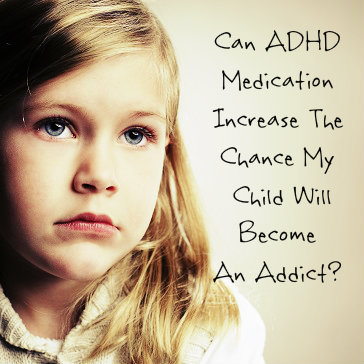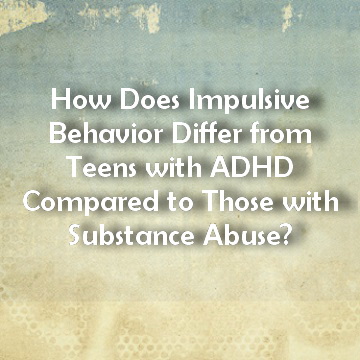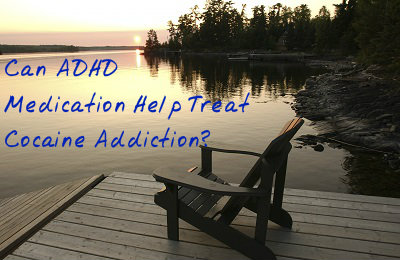Attention deficit hyperactivity disorder, or ADHD, is a common behavioral disorder in childhood. If you have a child with ADHD you are far from alone. Many kids use medication as part of the treatment for ADHD and there have been some concerns that these drugs could lead to later problems of substance abuse. Whether ADHD medications cause an increased risk for later addiction is not fully known, but what is certain is that you as a parent have the biggest influence over your child’s choices.
ADHD Treatment And Medications
 Experts agree that the best way to treat the symptoms of ADHD, which include hyperactivity, inability to focus or concentrate, and impulsive behaviors, is with both therapy and medication. Using drugs alone is not the best solution to helping kids with ADHD. When they learn to modify their behaviors and are given medications to help them better focus, they have the best odds of success.
Experts agree that the best way to treat the symptoms of ADHD, which include hyperactivity, inability to focus or concentrate, and impulsive behaviors, is with both therapy and medication. Using drugs alone is not the best solution to helping kids with ADHD. When they learn to modify their behaviors and are given medications to help them better focus, they have the best odds of success.
The medications that are used to treat ADHD are stimulants. Although it may seem counterintuitive, these stimulants actually help children to focus, to concentrate on one thing at a time, and to be able to control impulses. There are different kinds of stimulants used for ADHD, including Ritalin, Concerta and Adderall, among others. Children needing one of these drugs may have to try a few before finding the right one and the right dose that maximizes benefits while minimizing side effects.
Will ADHD Medications Cause Future Drug Abuse?
There has been controversy surrounding the use of stimulant medications to treat ADHD in children, but nothing has yet outweighed the benefits that these drugs have given kids. Some claim that kids are overmedicated and the drugs can cause lasting harm, although there is no evidence for this. One very real problem is abuse of ADHD prescriptions. It is not uncommon for teens and college students to use these drugs (which are mostly amphetamines) in large quantities to stay up late for studying and writing papers. This abuse can definitely lead to addiction.
Another controversy has been the fear that even the use of ADHD medications by kids following a doctor’s instructions could lead to future addiction. A few studies have made this connection, but have failed to show whether it was conclusively the drug or other factors that led to later drug abuse. A more recent review of these kinds of studies failed to find real and substantial evidence that ADHD drugs cause a child to abuse drugs or become addicted to drugs later in life.
The review included 15 separate studies and more than 2,000 participants. The result was that being medically treated for ADHD has no connection to future drug abuse. It neither increases nor decreases the risk of drug addiction. An interesting finding is that simply having ADHD can increase a child’s risk of future drug abuse; it seems likely that treating the disorder could therefore reduce the risk.
Good News For Parents Of Children With ADHD
The good news for parents of children with ADHD is that stimulant medications are largely helpful. As long as there are no serious or disruptive side effects the drugs can help kids focus in school, get along with peers better, and be more successful. The risk of developing substance abuse problems later in life is not related to medication.
In fact, what all experts know is that parents’ influence and behaviors is the biggest determining factor in whether a child abuses drugs. Talk to your children about drug abuse and develop a healthy relationship and you can steer them in the right direction.
Read More About Mental Health, Teens And Addiction
If you have had a child diagnosed with attention deficit hyperactivity disorder (ADHD) you probably have a lot of questions and just as many concerns. We hear a great deal in the media about over-medicating children. What does this mean for your child and his disorder? Will using medications to help him focus put him at risk for further drug abuse, and even addiction? The answers to these questions are not simple, but the more you learn about ADHD medications and treatment, the more comfortable you will be making decisions in the best interest of your child.
How Do Medications Help Children With ADHD?
 ADHD is a disorder that is characterized by difficulty focusing and paying attention, impulsive and inappropriate behaviors and hyperactivity. These often manifest during school hours making academic success a major challenge for kids with ADHD. Medications used to treat the disorder are stimulants. This may seem counterintuitive, but they dramatically reduce hyperactive impulses, and allow children to focus and pay attention. For the best results, a combination of medication and behavioral therapy is often recommended by experts.
ADHD is a disorder that is characterized by difficulty focusing and paying attention, impulsive and inappropriate behaviors and hyperactivity. These often manifest during school hours making academic success a major challenge for kids with ADHD. Medications used to treat the disorder are stimulants. This may seem counterintuitive, but they dramatically reduce hyperactive impulses, and allow children to focus and pay attention. For the best results, a combination of medication and behavioral therapy is often recommended by experts.
Are ADHD Drugs Addictive?
Stimulants used to treat ADHD, including Adderall and Ritalin, are addictive. Like other addictive drugs, they produce a pleasurable sensation related to certain brain chemicals. If these drugs are abused over time, the user can become addicted. When taken as directed, however, the risk of becoming addicted to these drugs is low.
If you monitor your child’s intake of his ADHD medications and follow your doctor’s instructions carefully, there is little chance that he will become addicted. It is natural to be concerned about the possibility. If it makes you more comfortable, keep the medication locked away and give the right dose to your child when he needs it. By controlling the administration, you can be certain he is not taking more than he is supposed to.
Does Use Of ADHD Drugs Lead To Further Drug Abuse?
There has been some debate about whether or not being medicated with stimulants for ADHD puts children at risk for later drug abuse. The best answer so far, thanks to researchers, is no. There seems to be little to no evidence that using ADHD medications as directed will lead to experimentation with other drugs, or addiction.
The greater danger results from the misuse of ADHD medications as a study drug. Teens and young adults, especially those in high school and college, abuse prescription stimulants as an aid to both studying and partying. One major reason for this abuse is that the medications have the effect of helping them stay awake. If a student needs to cram for an exam, she might take Adderall to stay up all night. Some students even take the medications to stay up late for the purpose of partying all night long. Both habits are very risky because they involve using addictive drugs without supervision from a doctor. This behavior can lead to addiction and other health problems.
Making Sure All Of Your Questions Are Answered When It Comes To ADHD Meds
The bottom line is that your child with ADHD could benefit greatly from supervised use of stimulant medications. If your doctor wants your child to try one, make sure all of your questions are answered and your concerns are addressed, but rest assured that using these drugs will not make your child an addict or a future drug abuser. Supervise your child, explain to him the dangers of abusing any kind of drug, and speak to your doctor to make sure that you and your child feel comfortable going forward with treatment.
Learn More About The ADHD And Drug Abuse Connection
Inattention and impulsivity are two mental/behavioral patterns that can substantially lower a person’s ability to function well in a range of social and interpersonal situations. While these patterns are commonly linked to the presence of attention-deficit/hyperactivity disorder (ADHD), they also occur in people unaffected by ADHD. In a study published in November 2013 in the journal Drug and Alcohol Dependence, researchers from the University of Chicago looked at both inattention and impulsivity as potential risk factors for increasing individuals’ sensitivity to the effects of the stimulant amphetamine. Typically, such an increase in drug sensitivity significantly heightens the risks for subsequent stimulant abuse and stimulant addiction.
Inattention Characteristics
 Inattention is the general term for an inability to stay focused on specific events taking place in your current surroundings, stay focused on specific details of your environment or stay focused during personal or group interactions with others. In the context of ADHD, these focusing problems contribute substantially to social and interpersonal dysfunction, characterized by such things as poor academic performance in school or college, difficulties making appropriate social adjustments to changing circumstances, underdevelopment of critical language and math skills, a reduced ability to get or keep a job, and difficulty maintaining personal or intimate relationships. Outside of the context of an ADHD diagnosis, inattention can increase a person’s risks for involvement in accidents or susceptibility to fraud or other deceitful behavior.
Inattention is the general term for an inability to stay focused on specific events taking place in your current surroundings, stay focused on specific details of your environment or stay focused during personal or group interactions with others. In the context of ADHD, these focusing problems contribute substantially to social and interpersonal dysfunction, characterized by such things as poor academic performance in school or college, difficulties making appropriate social adjustments to changing circumstances, underdevelopment of critical language and math skills, a reduced ability to get or keep a job, and difficulty maintaining personal or intimate relationships. Outside of the context of an ADHD diagnosis, inattention can increase a person’s risks for involvement in accidents or susceptibility to fraud or other deceitful behavior.
Impulsivity Characteristics
Impulsivity is a term used to describe a tendency to act without significant forethought, or to act while ignoring previously gained insights regarding the negative potential outcomes of one’s actions. In the context of ADHD, the tendency to act impulsively contributes to the same general forms of social and interpersonal dysfunction that appear in people affected by ADHD-related inattention. Outside of the context of ADHD, impulsivity is linked to increased risks for a group of mental health conditions called personality disorders, as well as increased risks for mania, a highly agitated or excitable state commonly associated with the presence of bipolar disorder.
Inattention, Impulsivity Problems And Susceptibility To Stimulants
In the study published in Drug and Alcohol Dependence, the University of Chicago researchers gave fairly low 20 mg, 10 mg and 5 mg doses of amphetamine to 165 adults with no history of substance abuse issues or other major health problems. After receiving each dose, each of these adults took part in tests designed to measure problems with inattention and problems with impulsivity. Each adult also filled out two questionnaires that helped the researchers gauge their sensitivity to the effects of amphetamine. For the sake of comparison, all 165 participants also went through the same testing procedures after taking a placebo drug dose that didn’t actually contain amphetamine or any other mind-altering substance.
The purpose of the project was to determine whether a high degree of impulsivity or inattention can increase a person’s susceptibility to the effects of amphetamine, and therefore make that person more susceptible to the eventual development of amphetamine abuse, amphetamine dependence or amphetamine addiction. The project’s designers undertook their efforts because, while previous studies had raised the possibility of a link between impulsivity, inattention and increased sensitivity to stimulant drugs, the authors of these studies had not examined this issue in detail.
At the end of the study, the researchers concluded that people affected by unusual degrees of inattention actually experience a decrease in their sensitivity to the mind-altering effects of amphetamine, not an increase. In addition, when amphetamine doses grow larger, people affected by inattention become less and less sensitive to the drug’s effects. The story is different for unusually impulsive people. When these individuals receive amphetamine, they exhibit a strong sensitivity to the drug’s effects. In addition, this sensitivity rises as the administered dose of amphetamine increases.
Results Of Strong Inattention, Impulsivity On Stimulant Abuse
The results of the study published in Drug and Alcohol Dependence indicate that the presence of unusually high levels of inattention may act as a hindrance to developing an abusive or addictive pattern of stimulant use. Conversely, the presence of unusually high levels of impulsivity may act as a factor in the development of these harmful patterns of stimulant intake. If this second point is true, then high impulsivity almost certainly adds to other known risks for developing stimulant abuse or addiction problems, rather than acting on its own as a primary factor.
Read More About Moms Abusing Stimulants
Cocaine is an illegal stimulant drug known for its ability to produce physical dependence by triggering long-term alterations in the brain’s normal chemical environment. The common ADHD medication methylphenidate (Ritalin, Methylin, Concerta) bears a strong chemical resemblance to cocaine, but produces less extreme changes in brain chemistry. In a study published in August 2013 in the journal JAMA Psychiatry, a multi-institution research team examined the potential effectiveness of methylphenidate as a treatment for cocaine addiction. The members of this team concluded that the medication apparently reverses some of the critical changes in normal brain function produced by cocaine.
Cocaine Addiction Basics
Cocaine use can lead to physical dependence (i.e., addiction) because the drug sharply boosts the brain’s levels of a specific chemical responsible for producing pleasurable sensations. An individual who experiences this cocaine-related spike in pleasure levels typically heads toward physical dependence when he or she seeks to re-experience the drug’s stimulant “high” again and again over time. In mental health terms, cocaine addiction belongs to a larger illness classification called stimulant use disorder (which in turn belongs to an even larger category of conditions called substance use disorders). This classification includes all forms of addiction stemming from the use of stimulant drugs or medications. It also includes all forms of non-addicted abuse of stimulant drugs and medications. Since issues of abuse and addiction are commonly intertwined, the stimulant use disorder diagnosis replaces all separate diagnoses of stimulant abuse and stimulant addiction.
Methylphenidate Basics
Like cocaine, Ritalin and all other forms of methylphenidate boost the brain’s levels of the chemical responsible for producing pleasure. Methylphenidate has this effect because it has a chemical structure that’s extremely close to the structure of cocaine. However, while cocaine triggers sharp, relatively extreme spikes in the amount of the brain’s pleasure-producing chemical, methylphenidate triggers a smoother, significantly less extreme increase in the amount of this chemical. If it’s taken in a manner not prescribed by a doctor, methylphenidate can easily play a role in abuse/addiction problems, just like cocaine or other stimulants such as amphetamine or methamphetamine. However, when used properly under a doctor’s supervision, it typically presents no unusual abuse or addiction risks.
New Findings
In the study published in JAMA Psychiatry, researchers from Stony Brook University and the National Institute on Alcohol Abuse and Alcoholism assessed the potential usefulness of methylphenidate in easing the effects of cocaine addiction. They decided to use methylphenidate specifically because of its structural resemblance to cocaine and its relatively weak ability to boost levels of the brain’s pleasure-producing chemical. In the same way that doctors can initially treat nicotine addiction with nicotine patches, the researchers wanted to know if it’s possible to initially treat cocaine addiction with methylphenidate. During the study, nine cocaine addicts received a single dose of methylphenidate on two separate occasions. After administering the methylphenidate, the researchers examined the participants’ brains with the help of modern, MRI-based imaging technology.
After reviewing the results of the participants’ brain scans, the researchers found that methylphenidate had two basic effects. First, when compared to a second group of cocaine addicts who did not receive methylphenidate, the addicts who did receive the medication experienced a significant reduction in activity in the part of the brain responsible for boosting pleasure levels. At the same time, these treated addicts also experienced an increase in activity in two other parts of the brain responsible for controlling emotions and regulating behavior. (These two brain areas are typically unusually low-functioning in people with cocaine addictions.) In follow-up interviews, the researchers asked the participants who received methylphenidate a series of questions designed to gauge any real-world changes in their levels of addiction. After completing these interviews, the study’s authors concluded that methylphenidate did indeed weaken the strength of the participants’ addiction-related thoughts and behaviors.
Considerations
The authors of the study in JAMA Psychiatry did not look at the possible effects of long-term methylphenidate treatment on cocaine addiction. However, from their short-term experiments, they concluded that methylphenidate can potentially make brain changes that are critical to disrupting cocaine addiction and giving users of the drug a chance to assert the personal control necessary to successfully take part in long-term cocaine recovery. Despite this potential, the authors note the preliminary nature of their findings and emphasize the need for further research on methylphenidate as a treatment for cocaine addiction or other forms of stimulant addiction. No one should use methylphenidate on his or her own as a cocaine addiction treatment. Such unprescribed and unmonitored use would constitute a form of drug abuse.
22 Aug 2013
How Does Impulsive Behavior Differ from Teens with ADHD Compared to Those with Substance Abuse?
Impulsive behavior, known more formally as impulsivity, is behavior that occurs spontaneously or with only minimal forethought or preparation. For a number of reasons, teenagers generally act impulsively more frequently than adults. Impulsivity in teens with attention-deficit hyperactivity disorder (ADHD) has been linked to increased risks for involvement in alcohol, drug and cigarette use. However, according to the results of a study published in 2012 in the journal Nature Neuroscience, the roots of the impulsive behavior found in teens with ADHD differ significantly from the roots of the impulsive behavior associated with teen substance use.
Teen Impulsivity Basics
The human brain relies on a specific region, called the frontal cortex, to perform and regulate such higher-level tasks as making judgments or decisions, gaining perspective on self-motivation and controlling fleeting or momentary urges. However, during adolescence, the frontal cortex is not completely formed. This lack of brain development goes a long way toward explaining why teenagers tend to act impulsively, even when they receive information from adults that’s designed to offset impulsivity. The authors of another study, published in 2009 in the American Psychological Association’s American Psychologist, concluded that teens age 16 and older actually have enough brain development to reason in a manner similar to adults. However, teens in this age group still generally lack the emotional maturity to adequately or consistently control their impulsive behaviors.
the frontal cortex is not completely formed. This lack of brain development goes a long way toward explaining why teenagers tend to act impulsively, even when they receive information from adults that’s designed to offset impulsivity. The authors of another study, published in 2009 in the American Psychological Association’s American Psychologist, concluded that teens age 16 and older actually have enough brain development to reason in a manner similar to adults. However, teens in this age group still generally lack the emotional maturity to adequately or consistently control their impulsive behaviors.
Impulsivity and ADHD
Along with hyperactivity, impulsivity forms one of the two basic symptoms of ADHD. Impulsive urges in a teenager (or younger child or adult) affected by the disorder may manifest as a generally high level of impatience, a tendency to frequently interrupt others, an inability to wait patiently in different situations, a general lack of emotional restraint, a tendency to disregard unpleasant outcomes of one’s actions, or an inability to tailor one’s words appropriately for a given social situation. Some teens with ADHD have prominent symptoms of impulsivity and hyperactivity, while others have little or no problems with hyperactivity/impulsivity and instead have significant problems maintaining focus or attention.
Connections to Substance Use
In the past, researchers have clearly linked the presence of ADHD to increased risks for substance use in teenage populations. In the study, published in Nature Neuroscience, a multinational research team explored this link by periodically examining the brain function of 1,896 adolescents. These teens were all age 14 when the study began, and underwent brain scans at two-year intervals over the next four years. During these scans, all participants were asked to perform tasks that measured their level of self-control. The researchers also used medical histories to determine how many of the study’s participants had symptoms of ADHD. In addition, they periodically asked the participants about their level of involvement with alcohol, drug and cigarette use.
After reviewing their findings, the authors of the study concluded that the presence of ADHD itself does not reduce teenagers’ ability to control their impulsive urges. Similarly, they concluded that teens who use substances also don’t generally have a reduced ability to control their impulses. This does not mean that teens who have ADHD or use substances don’t act impulsively; it simply means that teens with these issues apparently don’t typically act impulsively any more often than teens unaffected by these issues. Critically, the authors of the study also concluded that when teens with ADHD do act impulsively, their behaviors are triggered by different brain pathways than the pathways that trigger impulsive participation in substance use. This finding suggests that the presence of ADHD-related impulsivity is not as likely to contribute to substance use risks as scientists once commonly believed.
Considerations
Interestingly, the authors of the study in Nature Neuroscience also concluded that the brain pathways that contribute to impulsivity-related substance use kick into gear even when some teenagers use only minimal amounts of a given substance. This finding strongly suggests that substance use itself does not lead to increased impulsivity in adolescents. Instead, the reverse is likely true, with the preexisting effects of impulsivity contributing to increased participation in substance use. In real-world terms, this means that some teenagers may have longstanding or built-in impulsive tendencies that make them much more susceptible to substance use (and subsequent problems with substance abuse or addiction) than other teenagers who come from similar backgrounds, belong to similar peer groups and participate in similar sorts of daily activities.
“The take-home message is that impulsivity can be decomposed, broken down into different brain regions,” says Hugh Garavan, one of the study authors. “The functioning of one region is related to ADHD symptoms, while the functioning of other regions is related to drug use.”



